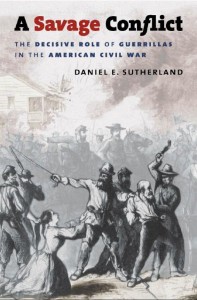 A Savage Conflict: The Decisive Role of Guerrillas in the American Civil War, By Daniel E. Sutherland
A Savage Conflict: The Decisive Role of Guerrillas in the American Civil War, By Daniel E. Sutherland
From the News-wire:
Newswise — Daniel E. Sutherland, professor of history at the University of Arkansas, has been awarded the Distinguished Book Prize by the Society of Military Historians for his work A Savage Conflict: The Decisive Role of Guerrillas in the American Civil War.
Sutherland’s A Savage Conflict is the first book to treat guerrilla warfare as critical to understanding the course and outcome of the Civil War. In what has been called “a meticulously researched account,” Sutherland argues that irregular warfare took a large toll on the Confederate war effort by weakening support for state and national governments and diminishing the trust citizens had in their officials to protect them.
Sutherland is the author or editor of 13 books, and five of his books have been selected by the History Book Club. His next book, Civil War Guerrillas, will appear in 2012.
Awarded since 1987, the Distinguished Book Prize recognizes the best book-length publications in English on military history, whether monograph, bibliography, guide or other project.
Let me be clear, Daniel E. Sutherland’s book A Savage Conflict is incredibly researched, informative, and well written. It deserves praise. However, the title also includes the wordage: “The Decisive Role of Guerrillas in the American Civil War.” And when I read the book there was not nearly enough within it to support any claim of “decisive” role played by irregular warfare during the Civil War. I would instead point the reader to Robert R. Mackey’s book The Uncivil War: Irregular Warfare in the Upper South, 1861-1865 that is far more convincing and contains a far better argument establishing that irregular warfare did not play a decisive role and in fact guerrilla warfare was an utter failure for the South.
For example, Sutherland ends the book stating that “guerrilla conflict… made the war a far bloodier affair than the armies alone could have done. They prolonged the war by months at least…” (p. 277).
Hardly a claim for “decisive” and symptomatic of the entire book. Seems like a flaw that was worth considering before winning awards.